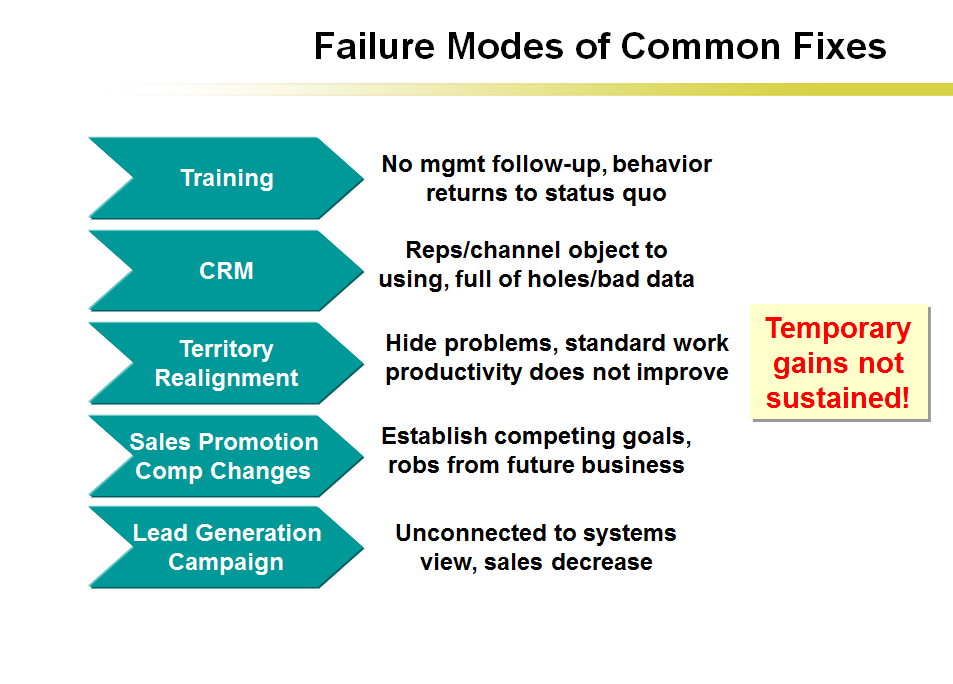The “Usual Fixes” for Sales Problems (And Why They Fail)
By Michael Webb
 A business’ success depends on its ability to change faster and more effectively than competitors. This requires an understanding of shifting customer needs and behaviors, and what customers are responding to vis-à-vis your company and the marketplace.
A business’ success depends on its ability to change faster and more effectively than competitors. This requires an understanding of shifting customer needs and behaviors, and what customers are responding to vis-à-vis your company and the marketplace.
If sales are not managed as a process, the process cannot be changed to rapidly address the true needs of the customer.
Your organization will resist change unless it can learn from the customer by understanding cause and effect within the sales process and then changing the sales process accordingly.
The usual fixes for sales problems usually fail because the actual
problem—and its cause—is rarely understood, or even identified.
Without understanding the chain of cause and effect between your sales activities and customers’ actions, you have a limited inventory of solutions to business challenges. I call these “the usual fixes” because they are so prevalent and because they usually fail to generate lasting improvement.
The usual fixes include:
- Replacing the sales manager or salespeople
- Trying a new type of sales training
- Launching a new lead-generation program in marketing
- Installing or upgrading customer relationship management (CRM) or sales force automation (SFA) software
- Changing the incentive plan or holding a sales contest
- Reassigning accounts or redrawing sales territories
- Hiring a new ad agency to tweak the brand image
Because the root causes of sales problems have not been identified, these fixes are usually implemented based on assumptions rather than facts. (In fact, many CRM systems actually mask data-driven feedback on conversion data in favor of someone’s arbitrary idea of “percent chance of closing.” That is simply ridiculous.)
Another view of the failure modes of common fixes is shown in Figure 1.
Figure 1:
I’m not saying the usual fixes are always wrong. I’m saying they can’t represent genuine solutions unless three things are true:
- The sales organization has agreed on operating definitions around its primary terms of production, such as leads, qualified opportunities, customers, etc. (meaning they can be traced to observable characteristics).
- The data gathered from sales operations demonstrates numerically the likely bottlenecks and causes of problems.
- The fix directly addresses causes.
This is rarely the case because sales is rarely managed as a process, which would deliver data usable in cause-and-effect analysis.
In addition, the usual fixes do little to address the most common barriers to higher sales performance. These barriers include poorly conceived value propositions, lack of operating definitions for key variables (such as “lead,” “qualified prospect” and “customer”), administrative tasks assigned to salespeople, problems in customer training or service, marketing initiatives unconnected to sales efforts, and misaligned incentive programs. These problems can be identified, analyzed and addressed when management approaches marketing, sales, and service as a process—and sets the usual fixes aside.
Questions to Consider
- How many of the usual fixes have we tried in the past two to four years?
- How did we decide to implement each fix?
- How have they added value for customers or improved the Customer’s Journey?
- How have they made selling easier, more efficient or more effective?
- What desirable or undesirable results have been achieved by these attempts at improvement?


